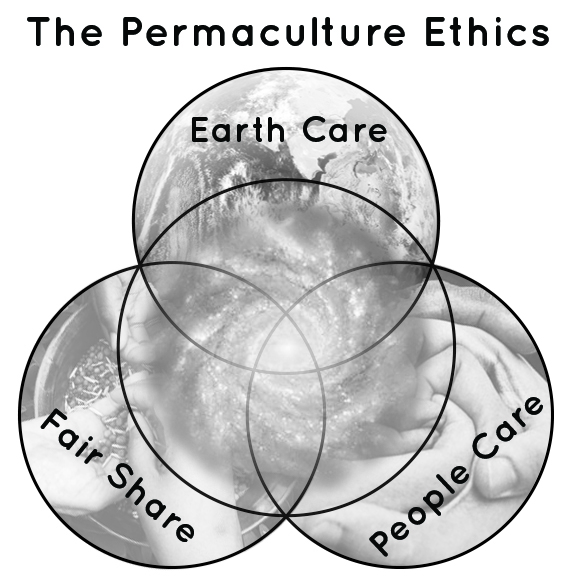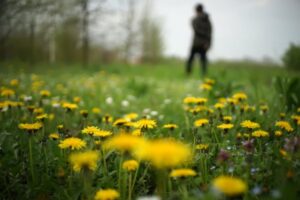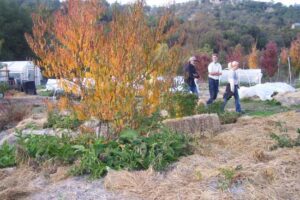There is a strong ethical congruence between Yoga and permaculture. Both disciplines are sciences that bolster the philosophy of non-violence, non-greed and right livelihood.
Living in positive relationship with everything and everyone around us is the foundation of yoga life and permaculture practice. In this article, we will examine the links between the ethics of both permaculture and yoga.

The ethics of permaculture are earth care, people care and fair share (or set limits and redistribute the surplus).
Earth Care
Earth care means tending to Mother Earth’s ecosystems and supporting the balance of all life. In other words, Earth Care is about living in symbiosis with natural systems, with the understanding that our survival depends on the health of the whole.
In order to support this ethic, humans must stop polluting and destroying the planet. Furthermore, this ethic points out that we have a responsibility to heal the damage that has already been done using ecological restoration and regenerative design.
People Care
From a permaculture perspective, the way we treat the earth is inextricably linked to how we treat fellow humans. From this understanding, we learn that people care is about dismantling oppressive power structures and building resilient communities.
Fair Share
Fair share is also called “future care”. It is often explained as setting limits to consumption and redistributing the surplus. It implies not only sharing with those who need it when resources are abundant, but also applying self regulation now so that future generations can prosper.

Nurturing the Earth and each other is key to a permaculture lifestyle.
The Ethical Foundation of Yoga
The ethics of Yoga are called the “Yamas and Niyamas,” or restraints and observances. For some, the first step on the spiritual path is disciplining oneself to follow the ethics, which ultimately comes from a place of incredible compassion for all beings.
Yamas (Restraints)
1. Ahimsa: Non-Violence
Ahimsa teaches that all life is sacred. It is important to cherish and protect all life. This applies socially (people care) and ecologically (earth care). When you hurt or destroy life, you are destroying an opportunity for survival and joy.
Oppression is violence. Hurtful words are violence. Social control is violence. Ahimsa asserts that when you oppress another, you traumatize not only that person, but you also hurt yourself and the whole system.

“Although initially we can see how helping our family and friends assists us in our own survival, we may evolve the mature ethic that sees all humankind as family, and all life as allied associations. Thus, we expand people care to species care, for all life has common origins. All are ‘our family’.”
– Bill Mollison, Permaculture: a designer’s manual
2. Satya: Truthfulness
Truthfulness means not only abstaining from telling lies, but also using our words to benefit others less fortunate than us. This ethic is about open communication, mutual understanding, and avoidance of deception.
Truthfulness applies to business interactions, in communities, and with ourselves. Truthfulness means never trying to confuse or convolute a situation, or hide the truth by covering things up. As long as your words are used to uphold justice and peace, you are following truthfulness.
3. Asteya: Non-stealing
Non-stealing as it relates to permaculture means leaving enough for all other organisms in nature, not taking land, resources or culture from other people without asking, and never taking more than you need in any situation.
When you eat more than you need to survive, it is basically like stealing from a starving person. We live in a society of over-abundance of food, consumer products, and non-renewable resources. Yet there is still too much waste and people who lack resources. The earth is bountiful – the problem is uneven distribution, not scarcity.

When we take only what than we need, there is enough bounty for everyone.
4. Brahmacharya: Sublimation of the senses
Brahmacharya is often translated as celibacy, but it doesn’t mean that for everyone. A sexually active person can practice Brahmacharya. That’s because brahmacharya is a moral code of conduct that teaches to never objectify or take advantage of others. Following brahmacharya means treating everyone as members of one divine family.
Brahmacharya asks us to regulate our urges through all of the senses, to act less compulsively and to conserve our energy for higher purposes like selfless service. Brahmacharya is a vital practice for the permaculture ethics. It is about redirecting our vital energy towards healing the planet rather than constantly chasing selfish pleasures.
5. Aparigraha: Non-greed
Greed is one of the main causes of harmful economic development and ecocide, so obviously non-greed is congruent with earth care. Aparigraha can also be translated as non-acceptance of gifts of bribes.
This doesn’t mean that we should never accept gifts form others, but to not accept gifts with ulterior motives. This ethic relates to fair share in that we learn when giving to others, not to expect something in return but to just give in the spirit of giving.

When we share our abundant gifts, it brings more joy into our own and others’ lives.
Niyamas (Observances)
1. Saucha: Purity (Internal and External)
Saucha can also be translated as purity or cleanliness. External purity is keeping the body and the environment clean, which helps to prevent disease and keep the mind stay clear and positive. The implications are simple: don’t waste and don’t pollute.
Internal purity means working towards purifying emotions by removing anger, greed, hatred and jealousy. It means doing practices everyday that release or sublimate these emotions, so that our actions are less clouded by negativity.
This ethic is inspiration to design a life that produces no waste, both internally and externally . In these ways, purity relates to the permaculture ethics of earth care, people care and fair share.
2. Santosha: Contentment
Santosha teaches to be content with what we have. When we learn to desire less, we will suffer less.
One could argue that the ecological crisis stems from greed, when people exploit other living things to get their desires. Therefore, if we practice contentment with what we have, we are on the right path towards honoring all life.

We never know what life will bring us. Practicing contentment helps us cope with whatever comes our way – good or bad.
3. Tapas – Austerity
All practices of Yoga are Tapas. In Tapas the mind and body are trained to do things they might not initially like. Eventually the practitioner overcomes likes and dislikes and enjoys everything. Austerity also implies discipline and purposely living with less than you may be used to.
Application of this ethic supports people care in that it leads a person to live a simple life. Fair share is more easily applied when people live simply. When we all live with a little less, there is more to go around. When we consume and use less, the earth is damaged less.
4. Swadhyaya – Study of Scripture / Self-study
Svadhyaya encourages us to actively work on seeing our true nature. That means taking time for self-inquiry, reflection, and contemplation. This ties into accepting feedback and applying self-regulation. Then our actions come from a place of harmony rather than confusion or malice.
Taking time with any philosophical and/or spiritual teaching that you connect with can be a part of a daily self-care practice. Part of people care is caring for the our need for clarity and sense of purpose and meaning in life.

Taking time to study and also turn within helps us feel more connected and inspired.
5. Ishwara Pranidhana – Surrender of the Ego
Surrendering the ego means to let go of the selfish and separate nature and contemplate on the bigger picture.
When Ishvara Pranidhana is practiced perfectly, one sees themself as part of everything else. The universe is an organism and your body is just one cell of it. Instead of trying to control things or do everything for your own gain, you devote yourself to humbly serving the bigger picture.
Humans commit atrocities only when we forget our connection with each other; only when they identify with the limited Ego. How can you hurt anything or anyone if you know they are part of you?
“Cooperation, not competition, is the very basis of existing life systems and of future survival.”
– Bill Mollison, Permaculture: a designer’s manual
Theory into Practice
“A ounce of practice is worth a ton of theory” – Swami Sivananda
While all of these ethics are nice ideas to think about, they only do good if they are applied vigorously in daily life. And to put it frankly, nobody said it would be easy. Applying the ethics takes a lot of dedication, hard work and perseverance.
The ethics require us to be stewards of our actions in every moment. In this day and age of unprecedented ecological destruction and social chaos, applying the ethics is vital for not our survival but also for our happiness in life.
We can radically transform the world by transforming our inner landscape through the Yamas and Niyamas. Similarly, the permaculture principles will help us change the world by guiding our interactions and relationships to be more mutually beneficial.
Yoga and Permaculture offer the tools, knowledge and wisdom to transform the world to embody our highest ethics. Through the regular and sustained practice of yoga and permaculture, together, we can manifest a truly peaceful paradise.
“A person of courage today is a person of peace.”
– Bill Mollison, Permaculture: a designer’s manual

Colin Eldridge
Colin is the founder of Fractal Permaculture. He is a trained permaculture designer and teacher. He teaches participatory and interactive classes around topics such as permaculture, art, social justice, nature awareness, holistic health, yoga and ecology.
More from our Blog

5 Edible and Medicinal Springtime Weeds
In many climates, winter full of precipitation ushers in bright green hillsides dotted with multicolored wildflowers. However, Spring also brings lots of new weeds in…
Read More
What is Forest Bathing?
Our dependence on technology and our separation from the natural world becomes more apparent every day. Therefore taking time to unplug and practice forest bathing…
Read More
5 Tips for Tending a Winter Garden
The below article was originally posted on the Sivananda Yoga Farm permaculture blog. You can view the original post here. There are so many benefits…
Read More

